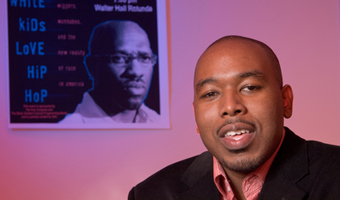By Akil Houston
Assistant Professor of Cultural and Media Studies
from Media Commons
Listen: mediacommons.futureofthebook.org/imr/2014/09/02/badu-family-ruminations-southern-aesthetic
Before southern rap was homogenized by a commercial industry obsessed with a derivative southern aesthetic with danceable drawled out hooks and questionable evidence of lyrics, the South crafted a distinct flavor. The Dirty South, not simply bass lines and high bpms developed an authentic sound. Appearing as smooth as moist red clay or coarse as Stone Mountain quartz, southern hip hop has always maintained a legible southern identity. Like southern culture as a whole, pride, geography and homespun wit function as distinct locales in southern hip hop aesthetics. The reality of lives shaped by living in the shadows of the antebellum era is evident in the musical culture. Songs with gospel like cadence, fashion that is cosmopolitan and local kitsch weaves a unique pattern of southern identity into hip hop.
From her debut studio album Baduizm to New Amerykah I & II, Erykah Badu embodies a southern aesthetic throughout her music and larger repertoire. Badu is the ultimate B-girl. The track “On and On” and “Love of My Life Worldwide (Ode to Hip Hop remix),” with Queen Latifah, Bahamdia and original Sequence member Angie Stone, mark her hip hop connections. However more than these single offerings, it is her territoriality of hip hop consciousness that both energizes her performativity and manifests a southern sensibility.
The Dungeon Family, a conglomerate of musical artists based in Atlanta, GA, had a hand in the early success of many southern artists. Rico Wade’s basement/the Dungeon served as the laboratory for musical productions. Organized Noise a production team of Rico Wade, Ray Murray and Sleepy Brown (sometimes others) crafted the sound for Outkast, Goodie Mob, The Witchdoctor, Future, T.I, Bubba Sparxxx, Nappy Roots, Killer Mike and others. Cool Breeze’s “Watch for the Hook” showcases the eclectic sound that became a hallmark of DF. The interpolation of the underappreciated Merry Clayton track, “Southern Man” serves as an ideal foundation. Clayton’s voice as the hook anchors the song within a tradition of soul first nurtured in the southern church. Repetition and innovation common in hip hop production can be seen by the use of Reservoir Dogs (1992). Rather than mere duplication, Reservoir Dogs is used as a canvas for renderings of a new south. This sensibility can be read through lyrics, geography and film stock hues seen in the flashes of scenery during dining locations and some posse shots.


















Comments